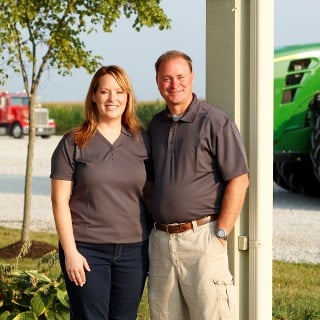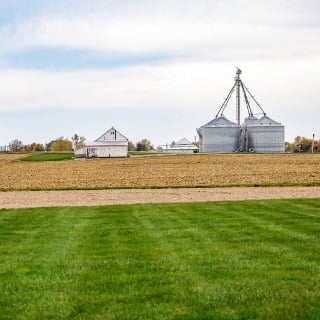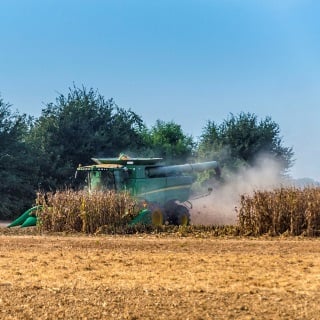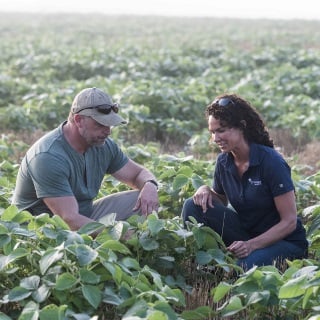At Farm Credit Mid-America, we know that the future of rural communities and agriculture rests in the hands of today’s young farmers, which is why we have a longstanding partnership with 4-H.
More than 6 million young people have benefitted from the 4-H experience, thanks in large part to volunteer advisors and trained 4-H educators who encourage them to discover their passion while developing lifelong skills like teamwork and leadership.
As part of National 4-H Week, we spoke with Jo Williams, 4-H educator at Ohio State University Extension in Scioto County, and Christy Leeds, extension educator and director of Union County 4-H at Ohio State University, to learn about their 4-H journeys and how they’re preparing kids for successful careers in agriculture.
Jo Williams
Q: How long have you been a 4-H member?
A: My dad worked in rural extension, so I remember going to 4‑H camp when I was 5, before I was even old enough to be a member. As a child, I went to my dad’s office in the evenings and there was a 4-H agent who also worked there. He was a wonderful guy and we would talk all the time, so I was very excited when I was old enough to be a real 4-H’er. I joined the Hilltoppers 4-H Club as a 9-year-old and continued through my senior year in high school.
Q: What made you want to pursue 4-H as a career?
A: My degrees are in journalism and public relations. I knew when I finished my Master’s that I wanted to teach, but I wasn’t sure where. The 4-H educator position in my home county opened up and my dad suggested I check it out. I realized that 4-H is teaching, it’s just a non-traditional style, and I liked the idea of not being tied to one classroom and giving the same lessons every year. There’s a lot of flexibility in choosing what we want to work on.
Q: What are your main responsibilities as a 4-H educator?
A: 4-H looks a bit different in each state. Here in Ohio, the bulk of our 4-H membership is through community clubs run by adult volunteers. All those folks have to go through background and reference checks, so a big part of the job is finding people and then training them to work directly with the kids. I also do youth development work with teen leaders, junior fair board, camp counselors and STEM programs at local schools.
Q: What skills did you learn while growing up in 4-H?
A: I always tell our volunteers that we’re teaching kids to become competent, successful adults. Looking back on my experience as a 4-H’er, I learned a lot while having fun. I honed skills like public speaking and interviewing, and also learned the importance of service.
Q: Why do you think 4-H is important for the future of agriculture?
A: I think that 4-H is vitally important for the future of agriculture because 4‑H and Extension bring the latest research‑based knowledge into the community. By teaching best practices to our 4‑H members, we help them develop into responsible, caring and quality individuals who will then become leaders in the agricultural community. Kids are always excited to experience new things, and if we give them the right tools and exposure, they are going to come up with great ideas all on their own.
Q: What is one thing you wished everyone knew about 4-H?
A: I wish people knew that 4-H isn’t just for farm kids, it’s for everyone. 4-H is a place where kids learn the kind of life skills that hard to teach and even harder to quantify – soft skills, people skills, emotional intelligence – and all sorts of other things that you can’t get from a book.
Q: What is the most rewarding part about your career as a 4‑H educator?
A: For me, it’s watching kids grow as they move through the program. Last spring, I took a group of teens and young adults to speak at a conference, and I watched a young man talk about what he got out of his 4-H experience. I remembered him as a quiet kid who sat in the back of the room and who we really had to encourage to participate in the teen leadership meetings. To see him now, bringing new young people into the program, teaching, giving back – it’s the best feeling.
Christy Leeds
Q: How old you were when you first got started in 4‑H?
A: I joined the Green Camp Shamrock 4-H Club when I was 9. My parents were 4‑H advisors and I even had a grandmother who was a 4‑H advisor in 1929, so it was a natural decision. I did all sorts of projects, starting with showing hogs, cattle and rabbits. I also did a lot of special interest projects like gardening and small engines, the non-breathing, non-livestock projects that make up a large part of 4-H. I think the breadth and depth of my experience led to my interest in working in youth development.
Q: How would you describe your job as a 4‑H educator?
A: For non-4-H folks, I describe my County Extension Educator job as the executive director of our local 4-H program. Our job is everything from A to Z that enables a county program to operate: volunteer recruitment, development, management, services for members, fundraising and tons of other things.
Q: When did you decide to make 4-H your career?
A: At 18 I went to college unsure of my major and signed up for nursing, which seemed like a good idea at the time. After my first semester, a light bulb went off and realized I needed to do what I know and love, so I switched to youth development. I think the reason it didn't occur to me is because there was no defined field of training for that subject. I actually ended up at the Ohio State Ag Education Department. They were just beginning to figure out that 4-H educators need different training than ag teachers, so several of us became guinea pigs and helped shape the early years of that program.
Q: How has 4-H influenced your leadership skills?
A: 4-H did for me what it's doing for teens still today: giving them real experience and the opportunity to practice leadership skills. I don't think it's possible to learn leadership in a vacuum or from a book or from talking about it in lectures. 4‑H gave me the chance to lead first on a small club level and later on as a camp counselor and a county fair board member.
Q: Why do you think 4‑H is good for your county?
A: 4‑H is positive youth development, and every kid needs that, no matter where they live. Union County, Ohio, is one of the fastest-growing counties in the United States, so we have a rural tradition that is rapidly suburbanizing and a growingly diverse population. The ultimate goal of 4‑H is to equip kids and young people with these skills that they will use for a lifetime in their jobs, family lives and communities.
Q: Why is 4‑H is important for the future of agriculture?
A: Our program continues to have a strong base of project work connected to agriculture, and I think that is hugely important because most citizens don't have a direct connection to food or livestock production anymore. Even though a 4‑H project is small-scale, members and their families will face all the challenges and the difficulties of producing an animal or a crop. We are creating ambassadors for the future of agriculture starting at age 9.
Q: What is the most rewarding part of being a 4‑H educator?
A: Some people describe our job as co‑parents, and I think that's a fairly apt description in the sense that we are helping to raise children. When they are young, their focus is mostly on club activities and projects. Once they reach the teen level, I get to work with them as they tackle county-level responsibilities, learn new skills, gain confidence and take on leadership roles in our 4‑H program and beyond. For me, that is the most rewarding part.






